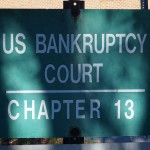Don’t bother looking, there really isn’t a Chapter 20 in the Bankruptcy Code. A Chapter 20, is negative term that Chapter 13 Trustees use when a debtor first files a Chapter 7 Bankruptcy, receives a Discharge of all his debts and then he turns around and files another bankruptcy case under Chapter 13 within weeks or months… [Continue Reading]
Stripping Junior Mortgages and Home Equity Lines of Credit
How does bankruptcy stop home foreclosure? Part 3 – Stripping Junior Mortgages and Home Equity Lines of Credit Welcome to Part 3 in a 3 part series on how bankruptcy can stop home foreclosure. In Part 1 we defined what foreclosure was and alternatives methods to stop a foreclosure. In Part 2 We discussed the… [Continue Reading]
Automatic Stay: How Bankruptcy Delays Foreclosure
How does bankruptcy stop home foreclosure? Part 2 – The Automatic Stay: Delaying Foreclosure Welcome to Part 2 in a 3 part series on how bankruptcy can stop home foreclosure. Part 1 described what foreclosure is. This installment will discuss how, at the time of the filing of a bankruptcy case, an “Automatic Stay” is… [Continue Reading]
What is Foreclosure?
How does bankruptcy stop home foreclosure? Part 1 of a three part series – What is Foreclosure? Welcome to Part 1 in a 3 part series on how bankruptcy can stop home foreclosure. In order to understand how filing a bankruptcy can stop a foreclosure and can help a distressed homeowner save his or her… [Continue Reading]
Student Loans May Be Discharged
In persons over the age of seven years, there is a strongly held belief that there really isn’t a Santa Claus living at the North Pole. There seems to be, among this same group, a strong belief that a debtor simply cannot discharge their student loans in bankruptcy. While, I cannot bring happy tidings about… [Continue Reading]
New Chapter 13 Plans for Eastern Michigan
What is a Chapter 13 Plan? In a Chapter 13 Bankruptcy case, the debtor is required to file a “Plan”. The plan is a written document that contains the debtor’s proposal for the reorganization of his financial affairs and the repayment of all or part of his debts. The Plan discloses the amount that the… [Continue Reading]
Debt Settlement Could be Worse than Bankruptcy Due To Tax Hit
Most of our clients in financial distress strive to avoid the filing of bankruptcy out of the shame that they feel. Because the client does not want to file for bankruptcy, we are often approached about settling debts instead. While we certainly applaud the desire of clients to attempt to repay their creditors and settle… [Continue Reading]
Debtors Do Not Act in Bad Faith in Excluding Social Security Income
Chapter 13 of the Bankruptcy Code allows individual debtors with regular income to reorganize their debts by catching up on mortgage arrearages, potentially stripping off 2nd and 3rd mortgages on their homes, restructuring payments on vehicles, and discharging a broader array of debts than can be discharged in a Chapter 7 filing. A Chapter 13… [Continue Reading]
Are Tax Penalties Dischargeable?
If there’s one thing that the government wants, it’s the revenue it collects for taxes. Not surprisingly, when it comes to bankruptcy, the government has ensured that it is a “preferred” creditor – so to speak. In general, taxes that are less than 3 years old are nondischargeable, as are tax debts where the debtor… [Continue Reading]
Brian Rookard presenting on Finance and Bankruptcy Aspects of Divorce
Part 1: Thursday November 8, 2012, 6pm-8pm – Family Court, Safety, and Other Considerations Part 2: Thursday November 15, 2012, 6pm-8pm – Financial Consideration and Becoming Your Own Advocate Location: 30400 Telegraph Rd., Suite 101, Bingham Farms, MI 48025 To register for the seminar contact Andrea Redman at: 248-334-1284 ext 389 or aredman@haven-oakland.org Not only… [Continue Reading]





